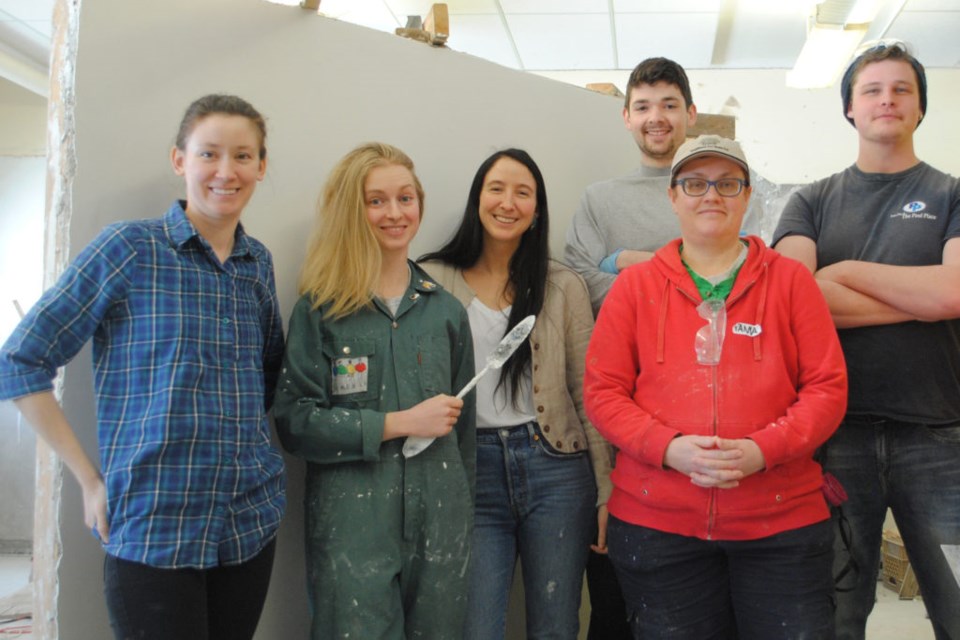Restoration arts school also welcomes skilled local instructors

Caitlin Wooll, third from left, with second-year Willowbank students. (Lauren O’Malley)
Niagara-on-the-Lake’s own Caitlin Wooll has made her way to Queenston, via Scotland. She’s also tumbled into a dream job as the education coordinator at the Willowbank School of Restoration Arts.
Having achieved her degree in English literature and creative writing, and spent 11 years abroad, Wooll wondered what it would be like to live in NOTL as an adult. She’s a bit of a scion, in that her grandfather, Gerald Ray Wooll, was once mayor of the town, and owned the Genaire plant.
It turns out Old Town wasn’t her cup of tea — or locally-brewed coffee, in that she had a job at Willow Cakes and Pastries, and lived in a basement apartment. With her love of heritage and architecture, Queenston — and NOTL’s other Willow — called to her.
Two years ago, Wooll applied for a receptionist position at the venerable learning institution, and got a flat in the village. “I was interested in heritage and preservation, and found Willowbank an interesting environment,” she says. “I started leading tours and helping with the school programming.”
“It’s a totally unique school,” says the personable brunette with the air of an old friend. “The education model is unique; the small class model is unique — there are really only ever 30 people at the school at any time.”
Her passion for the subjects and the school itself led to Wooll being promoted promptly. She now has the rather weighty job of scheduling all classes and creating the calendar. “I love all the students and the programs, which makes it easier,” says the 32-year-old. “The core curriculum has already been invented, including plastering, stone carving, drafting by hand; plus cultural landscape.”
The school is undergoing another internal shift, having lost a succession of executive directors for a variety of reasons. Lorri Gillanders is a board member who has stepped in as the interim director, but will only hold this position temporarily. Willowbank is currently interviewing candidates for managing director, who will do “all the inward-facing work, running the sites and overarching programs,” says Wooll. There is also potentially a role available for a third person for “business development, outward-facing work, and fundraising,” she says.
Willowbank is also recruiting students. The three-year program yields a diploma in Heritage Conservation. The success rate of students is very high, says Wooll, in that most graduates are hired promptly. Third-year students work in the field, and the current crop of six have such diverse positions as historic preservation project assistant; heritage planning with the Town of Grimsby; stained glass work, and heritage masonry work. One student is running his own restoration business, and another is building her own tiny home on the frame of a trailer.
“They have jobs that are all over the map, in a good way,” says Wooll. “They come in with varied backgrounds, and go back out into varied jobs.”
Community engagement is important to the school. Local Brett Sherlock is teaching a decorative arts course, and other locals with practical talents have also shared their knowledge. “We’re always open to instructors with relevant skills,” says Wooll.
“We often get calls from members of the public regarding, for example, a heritage gate. We will connect them with an alum or teacher,” she says, noting the school is eager to help locals with restoration questions and issues.
“We have had lots of interest from the public, including tradespeople, so we will likely be opening up classes for auditing,” says Wooll, recognizing the appeal of the courses offered. “But we don’t want to detract from the full-time students’ experience, so we will do this cautiously.”
“We want to make it clear the community is very welcome to come by — there are no gates, the grounds are always open,” she says affably. “The students are very friendly, and always eager to get to know people.”
Another new development at the school is an exclusive arrangement with NOTL’s own Robin Howe. As of January, Howe’s catering company is now the contact for any of the property’s rentals for events. “It’s a beautiful venue,” says Howe. “It’s not for everyone, because it is a working school of restoration, with unfinished walls exposing different layers of plaster and lathe. But it’s a beautiful atmosphere.”
He explains rentals can include the mansion and grounds, or just the second floor interior.
And, as Wooll says, the grounds are always open to the public — for exploring, picnicking, hill-rolling and more.